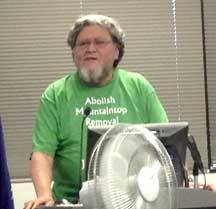Kentuckians want better protection than what's in the general permit

Members of KFTC and ally groups asked state officials to care about the quality of the water where they live, and recognize its importance for social and economic activity, during a public hearing Wednesday night focused on pollution from coal mining operations.
They commented on the draft General Permit for Coal Mining, which governs water pollutant discharges from the mining and processing of coal. Once adopted by the state and approved by the U.S. EPA it will govern discharges for the next five years.
Several of those who spoke asked that the general permit not even be used. They said that requiring companies to get individual permits instead would provide better protection for streams and the people who live along them.
 “General permits are basically a carte blanche,” pointed out George Aros, a KFTC member from Frankfort.
“General permits are basically a carte blanche,” pointed out George Aros, a KFTC member from Frankfort.
“We don’t need a general permit; we need specific permits for specific mines,” said KFTC member Susan Williams.
“The concept of a general permit … is flawed,” said Lane Boldman with the Kentucky Environmental Foundation. “It fails to address very specific differences [in stream conditions].”
Eric Chance, a water quality specialist with Appalachian Voices, also opposed the use of the general permit. “The general permit fails to account for variability in streams and effluent coming from mines.”
KFTC member Zaida Balendez recognized that individual permits give affected residents more say about pollution in their community. “The individual citizens of each watershed should be allowed to comment on what is happening in their watershed. To not have this progress in our own state is ridiculous.”
 And Elaine Tanner from the Mill Creek community in Letcher County said the general permit has been misapplied in the past, and that has contributed to the poisoned water that about 100 families in her community have experienced.
And Elaine Tanner from the Mill Creek community in Letcher County said the general permit has been misapplied in the past, and that has contributed to the poisoned water that about 100 families in her community have experienced.
“In 12 years I’ve yet to find out why they can determine that a general permit is acceptable instead of an individual permit,” she said, adding that some times regulatory agencies don’t agree or contradict themselves about which is needed.
Although the general permit is an improvement over the current one in terms of monitoring individual discharges, it does not address the cumulative impact of mining pollution on streams. As a result, already degraded streams can get even worse, and good quality streams can get polluted.
“We would like to see its applicability narrowed – exclude discharges into any impaired streams, whether or not there is a TMDL for that stream, especially since there are not any TMDLs for pollutants related to coal mining,” said Chance.
TMDLs are Total Maximum Daily Limits, a “calculation of the maximum amount of a pollutant that a waterbody can receive and still safely meet water quality standards,” according to the U.S. EPA. The general permit sets limits only for individual discharges regardless of the condition of the receiving stream.
He also noted that conductivity is “one of the leading causes of stream impairment. The streams would be better protected if there were a numeric limit on conductivity.”
So even if all individual polluters are meeting the limits of their general permits, the quality of a waterway can still get worse.
Another concern expressed by several speakers was the dropping of an exclusion against general permit discharges within five miles upstream of a public water intake. That exclusion is what has meant A&G coal company has needed an individual permit – subject to more scrutiny by the community and U.S. EPA – for its plans to mine in the watershed with the drinking water source for the towns of Benham and Lynch in Harlan County.
A&G is owned by James Justice, a mega-donor to campaigns and committees of Gov. Steve Beshear and the Democratic Party.
State officials said the exclusion regarding public water intakes in the general permit is not needed because the prohibition exists in other statutes. But that is not satisfactory to several who spoke.
 “We’ve got some of the best water right now that’s ever been bottled in Kentucky,” said Lynch resident and KFTC member Stanley Sturgill. “Why a state would want to lower the rules … it saddens me. I don’t understand it. If it [the exclusion] was in there and you took it out and it’s a regulation, put it back. Once we lose our water, we are just absolutely devastated.”
“We’ve got some of the best water right now that’s ever been bottled in Kentucky,” said Lynch resident and KFTC member Stanley Sturgill. “Why a state would want to lower the rules … it saddens me. I don’t understand it. If it [the exclusion] was in there and you took it out and it’s a regulation, put it back. Once we lose our water, we are just absolutely devastated.”
“Go ahead and put it back in,” added KFTC member Mary Love, a request echoed by several others.
Two industry representatives who testified complained about the WET testing requirement in the draft general permit and the “massive expenditures” that will be required by the coal industry “merely to identify that their discharges represent no threat,” said Lloyd Cress of the Kentucky Coal Association (who also blamed the economic decline of eastern Kentucky on the U.S. EPA).
WET (Whole Effluent Toxicity) tests measure the polluted water's effects on specific test organisms' (plants, vertebrates and invertebrates) ability to survive, grow and reproduce.
Ama Bentley, president of Appalachian States Analytical laboratory in Pikeville, said there are not enough labs in Kentucky qualified to do WET testing for the thousands (estimated to be 5,500) of coal mining discharges. She also expressed concern about the data access (slow download times) and the challenge of transitioning to this new testing system.
Resources
KFTC Handout on the General Permit for Coal
Draft General Permit for Eastern Kentucky
Draft General Permit for Western Kentucky
Division of Water Factsheet for eastern Kentucky
Division of Water Factsheet for western Kentucky
For more information, contact Kevin Pentz, Canary Project Organizer, at 606-335-0764 or [email protected]
Written comments will be accepted until July 1. Mail to the Division of Water at 200 Fair Oaks Lane, Frankfort, Ky 40601 or email to [email protected].
Judy Petersen with the Kentucky Waterways Alliance said that WET tests are important and needed.
“The WET tests and the biological tests are supposed to get to the specific conductance issue,” she said. “Only 6 percent of the water in eastern Kentucky fully supports aquatic life. Specific conductance is why these streams don’t support aquatic life. I want Kentucky to protect our rivers and streams and the health of the people who live there.”
Specific conductance, or conductivity, is a measure of the chemicals dissolved in water and provides a general indication of the level of pollution. The U.S. EPA has recommended that stream conductivity be limited to 500 micro-Siemens (μS/cm), a level at which most native aquatic life cannot exist. But state officials did not include a conductivity limit in the draft general permit since many streams below coal mines already fail to meet that standard.
“WET testing is critical for identifying places that could affect public health,” added Deborah Payne, the health coordinator for the Kentucky Environmental Foundation.
Aros noted that the quality of water has real impacts for the people who are forced to live in polluted areas. “On the block in Louisa where we lived had four families suffering from cancer,” he said of his former neighborhood. “Water is the basis for life. The purity of it is the responsibility of everyone.”
Tarence Ray of the Kentucky Headwaters project in Letcher County noted the “direct links between economic development and water quality. From an economist’s standpoint it is difficult to attract activity to waters that are polluted or have dead wildlife.”
This concern also was addressed by Williams. “If we want to have an economic boom in eastern Kentucky and western Kentucky, you’ve got to improve waterways,” she said, giving examples of how clean water affects tourism and other economic opportunities.
Others speaking were Jimmy Hall of Mill Creek, Alex DeSha with the Sierra Club, and Tyler Offerman for the Kentucky Student Environmental Coalition.
“Young people in this state are very concerned about the quality of water [and] the blatant weakening of water protections,” Offerman said. “We see this draft general permit for what it is, which is an attack on the few protections for water we have … We ask the cabinet for strong protections.”
Recent News
Kentucky’s past legislative session showed alarming trend toward government secrecy
Churchill Downs takes more than it gives. That's why the Kentucky Derby is a no-go for me
‘We must never forget.’ Kentucky town installs markers for lynching victims.
Featured Posts
TJC Rolling Out The Vote Tour – a KFTC Reflection Essay
KFTC Voter Empowerment Contractor Reflection Essay
Voting is Power
Archives
- Home
- |
- Sitemap
- |
- Get Involved
- |
- Privacy Policy
- |
- Press
- |
- About
- |
- Bill Tracker
- |
- Contact
- |
- Links
- |
- RSS

